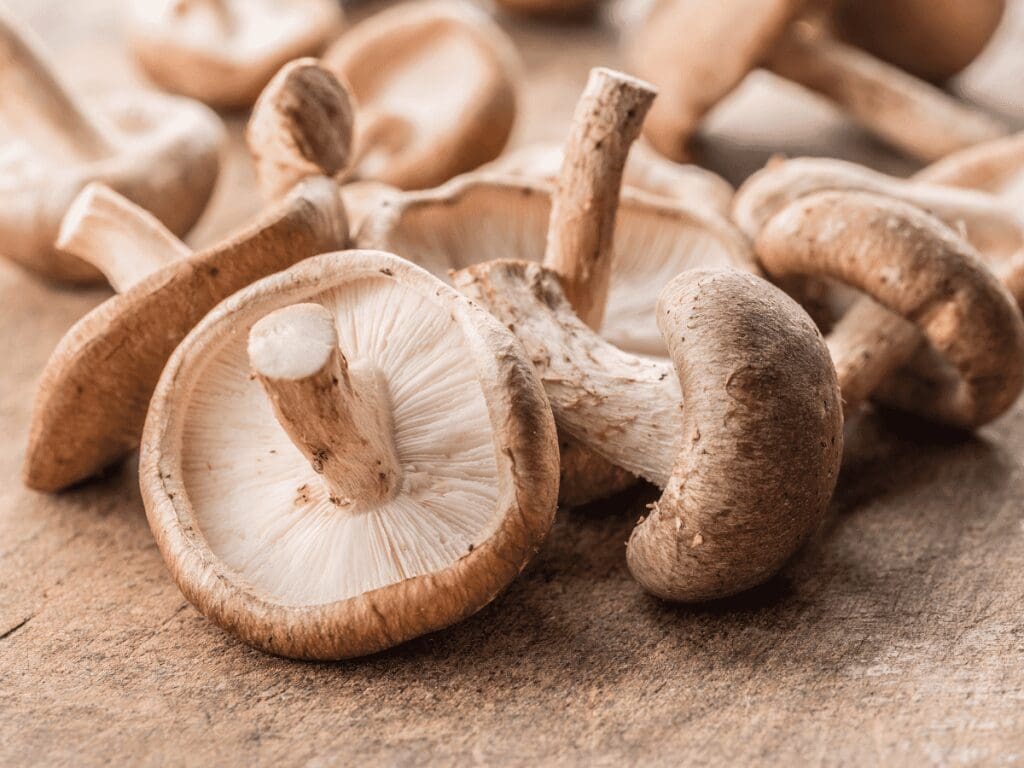Key Takeaways:
- Nutritional Powerhouses: Mushrooms are rich in vitamins, minerals, and antioxidants, which support immune function and reduce inflammation, benefiting gut health significantly.
- Versatile Dietary Addition: Cooking mushrooms enhances their digestibility and nutrient availability, making them a versatile and beneficial addition to any diet.
- Consultation is Crucial: Before adding mushrooms or mushroom supplements to your diet, consulting with a healthcare provider is essential to avoid potential allergies and interactions with medications.
HappyHemp, a leader in holistic health, promotes the use of natural remedies to improve overall wellness. As experts in this area, we highlight mushrooms not just as food but as key players in gut health, which is essential for our body’s overall functioning and well-being.
Gut health influences everything from immune system efficiency to mental clarity. This article explores the specific benefits of various mushrooms like Shiitake, Lion’s Mane, and Reishi, and provides practical advice on how to incorporate them into your diet for optimal gut health. We’ll cover everything from the nutritional advantages of mushrooms and how they support the gut microbiome, to easy recipes and preparation tips. Whether you’re looking to enhance your diet or seek natural remedies for gut health issues, this guide offers valuable insights into making mushrooms a beneficial part of your wellness routine.
Happy Hemp’s Mushroom Gummies are the perfect way to reap the gut health benefits of mushrooms in a delicious and easy form. Crafted with Amanita Muscaria, these gummies support your microbiome and overall well-being with every tasty bite. Let Happy Hemp’s Mushroom Gummies be your simple, natural solution for integrating the power of mushrooms into your health-conscious lifestyle.
The Importance Of Gut Health
What Is Gut Health And Why It Matters
Gut health refers to the balance and function of the bacteria and other microbes in the gastrointestinal tract. This balance is essential for a functioning immune system, effective digestion, and the absorption of vital nutrients. The gut microbiome also influences the production of neurotransmitters that regulate mood and cognitive functions.
The Link Between Gut Health And Overall Wellness
There is a robust link between gut health and overall physical and mental wellness. Poor gut health can lead to chronic inflammation, which is associated with a range of serious conditions including type 2 diabetes, heart disease, and various autoimmune disorders. Furthermore, mental health issues such as anxiety and depression can also be exacerbated by imbalances in gut microbiota. Keeping the gut healthy, therefore, is crucial for maintaining general health and preventing various diseases.
Common Gut Health Issues And How To Address Them
Gut health problems can manifest in many forms, including irritable bowel syndrome (IBS), inflammatory bowel disease (IBD), and various bacterial infections. These conditions can significantly impair quality of life by causing symptoms such as bloating, pain, and other digestive discomforts. To address these issues, dietary changes such as increasing fiber intake and incorporating probiotics are often recommended. Additionally, including specific foods known for their gut health benefits, like certain types of mushrooms, can help in alleviating these symptoms and restoring gut balance.
Why Mushrooms Are Beneficial For The Gut
Nutritional Profile Of Beneficial Mushrooms
Mushrooms are a rich source of vitamins, minerals, and antioxidants, making them an excellent addition to a gut health diet. They contain high levels of vitamin B, selenium, and essential minerals such as potassium and copper. These nutrients support immune function and reduce inflammation, which is particularly beneficial for the gut lining. Furthermore, mushrooms are a good source of dietary fiber, which promotes a healthy gut microbiome by fostering beneficial bacterial growth.
How Mushrooms Support The Gut Microbiome
Mushrooms contribute to gut health by acting as prebiotics—food for beneficial gut bacteria. The unique fibers and polysaccharides found in mushrooms, such as beta-glucans, help nourish and balance the gut microbiome. This not only improves digestive health but also enhances the body’s ability to fight off illness and disease.
Anti-Inflammatory Properties Of Mushrooms
Inflammation in the gut can lead to numerous health issues, including chronic diseases such as Crohn’s disease and ulcerative colitis. By incorporating anti-inflammatory foods like mushrooms into the diet, one can help reduce gut inflammation and protect against these conditions. Mushrooms such as Reishi and Turkey Tail are particularly noted for their anti-inflammatory effects.
Top Mushrooms For Gut Health
Shiitake Mushrooms
Shiitake mushrooms are renowned for their ability to boost the immune system and support gut health. They are rich in polysaccharides like lentinan, which enhance cellular immunity and help fight off infections. Shiitake also promotes the production of beneficial gut bacteria, improving overall digestive health.

Lion’s Mane Mushrooms
Lion’s mane mushrooms have unique properties that benefit both the brain and the gut, often referred to as the “gut-brain axis.” These mushrooms contain compounds that stimulate the growth of nerve cells and may improve cognitive function. For the gut, lion’s mane can help regenerate gut lining, which is crucial for preventing and treating conditions like leaky gut syndrome. This dual action makes lion’s mane an exceptional mushroom for overall health and wellness.
Reishi: The Stress Reducer
Reishi mushrooms are often called the “mushroom of immortality” due to their extensive health benefits, particularly in reducing stress and its impacts on the body. They contain triterpenes, which have a calming effect on the nervous system, and help manage stress levels that can adversely affect gut health. Additionally, Reishi supports immune function and reduces inflammation in the gut, which can help alleviate symptoms of digestive disorders.
How To Incorporate Mushrooms Into Your Diet
Easy Recipes For Daily Meals
Incorporating mushrooms into your daily diet can be both simple and delicious. Here are some easy ways to enjoy mushrooms in your meals:
- Mushroom Omelet: Start your day with a nutritious mushroom omelet. Sauté sliced mushrooms with a bit of garlic and spinach, then add to beaten eggs and cook until set. This dish is not only easy to make but also packed with proteins and essential nutrients, perfect for a healthy breakfast.
- Mushroom Soup: For a comforting lunch, try making a creamy mushroom soup. Cook chopped onions and garlic until translucent, add a mix of mushrooms, and let them brown. Pour in vegetable broth and a splash of cream, simmer for a while, then blend until smooth.
- Stuffed Mushrooms: A great appetizer or side dish, stuffed mushrooms are versatile and crowd-pleasing. Remove the stems from large mushrooms, stuff them with a mixture of breadcrumbs, grated cheese, and herbs, and bake until golden. These are fantastic for entertaining or as a savory snack.
- Mushroom Stir-fry: For a quick and healthy dinner, whip up a mushroom stir-fry. Use a variety of mushrooms and toss them with sliced bell peppers, onions, and snap peas in a hot pan with soy sauce and ginger. Serve over rice or noodles for a complete meal that is full of flavor and beneficial nutrients.
These recipes show how easy it is to add mushrooms to your diet, helping to improve gut health and increase your intake of vitamins and minerals.
Mushroom Supplements
If fresh mushrooms aren’t your thing or you’re looking for a more concentrated form, mushroom supplements can be an excellent alternative. When choosing supplements, look for products that specify “whole mushroom extract” and provide information about the source and type of mushrooms used. It’s important to choose supplements that are free from fillers and additives to ensure you’re getting the pure benefits of mushrooms.
Tips For Buying And Storing Mushrooms
Selecting high-quality mushrooms is key to maximizing their health benefits. Look for mushrooms that are firm, dry, and free from mold. Avoid washing mushrooms under water as they absorb moisture; instead, gently wipe them with a damp cloth to clean. Store them in a breathable bag in the refrigerator to extend their freshness. Properly handling and storing mushrooms ensures they retain their nutritional properties and flavor.
Preparing Mushrooms For Optimal Benefits
Best Practices In Mushroom Preparation
To maximize the health benefits of mushrooms, proper preparation is key. Cooking mushrooms can actually increase their digestibility and enhance the availability of some nutrients, such as potassium and selenium. Sauteing or grilling mushrooms with a bit of healthy fat, like olive oil or avocado oil, can help in absorbing their fat-soluble vitamins more effectively. Additionally, avoid overcooking to preserve their nutritional content and texture.
Cooking Mushrooms Vs. Consuming Them Raw
While most mushrooms are more beneficial when cooked, some types can be eaten raw, such as common button mushrooms, which are great in salads. However, cooking mushrooms is generally recommended to break down tough cell walls, making it easier for the body to access their valuable nutrients. Cooking also helps eliminate any potential bacteria or contaminants that raw mushrooms might carry.
Pairing Mushrooms With Other Gut-Healthy Foods
Mushrooms pair well with other gut-healthy foods. Combining mushrooms with fibrous vegetables like leafy greens, root vegetables, and cruciferous veggies like broccoli can improve gut motility and microbiota diversity. Additionally, using herbs and spices such as garlic, turmeric, and ginger not only adds flavor but also compounds the anti-inflammatory and immune-boosting properties of your meals.

Potential Side Effects And Considerations
Understanding Mushroom Allergies And Sensitivities
While mushrooms offer numerous health benefits, they can also trigger allergies or sensitivities in some individuals. Symptoms can range from mild gastrointestinal discomfort to more severe reactions like hives or respiratory issues. It’s important to start with small amounts when introducing mushrooms into your diet and monitor how your body responds. If you experience adverse effects, it may be best to consult with a healthcare professional.
When To Avoid Mushrooms In Your Diet
Certain medical conditions may necessitate avoiding mushrooms. For example, individuals with known fungal allergies or those on specific types of immunosuppressive medications should steer clear of mushrooms, as they could exacerbate symptoms or interact with medications. Additionally, some mushrooms are high in purines, which can be problematic for people suffering from gout.
Consulting Healthcare Providers About Mushroom Supplements
Before integrating mushroom supplements into your wellness routine, it’s crucial to consult with a healthcare provider, especially if you have underlying health conditions or are taking other medications. Supplements can interact with medications and might not be suitable for everyone. A healthcare provider can offer guidance tailored to your health needs and conditions, ensuring safe and effective use of mushroom products.
Final Thoughts
Embracing mushrooms as part of your dietary regimen can significantly enhance your gut health and overall wellness. From Shiitake to Lion’s Mane, each variety offers unique benefits that can support immune function, reduce inflammation, and improve the gut microbiome. By incorporating mushrooms into your meals, whether through simple recipes or supplements, you can take advantage of their medicinal properties. However, it’s important to consider potential allergies and consult with a healthcare provider, especially if you have existing health conditions or are taking other medications. With mindful integration and proper preparation, mushrooms can be a valuable addition to a health-conscious lifestyle, promoting not only gut health but also contributing to a holistic sense of well-being.
Read also:
- Discover the Power of Happy Hemp’s Amanita Muscaria Mushroom Gummies: A New Dimension in Natural Wellness
- How to Detox Your Body in a Healthy Way Using CBD
- Unlocking the Power of Mushroom Supplements: Immune Support and Cognitive Enhancement
Frequently Asked Questions About Best Mushroom For Gut Health
How does Turkey Tail mushroom benefit gut health?
Turkey Tail contains polysaccharides that support the immune system and gut microbiota, and can act as a prebiotic.
What makes Chaga mushrooms good for the gut?
Chaga mushrooms are potent antioxidants that help reduce inflammation in the gastrointestinal tract and support a healthy gut microbiome.
Can eating mushrooms help with conditions like IBS?
Yes, certain mushrooms like Chaga have been shown to alleviate symptoms of IBS and other gastrointestinal disorders by reducing inflammation and promoting gut health.
Are there any mushrooms that specifically help with leaky gut?
Chaga and Reishi mushrooms are known for their roles in reducing gut permeability, commonly referred to as “leaky gut,” by strengthening gut lining and reducing inflammation.
Are there any potential risks associated with consuming mushrooms for gut health?
While generally safe, some individuals might experience bloating or digestive discomfort, especially when consuming high amounts.
How often should mushrooms be consumed to benefit gut health?
Regular consumption as part of a balanced diet is recommended, though the exact frequency can depend on individual health needs and the form of mushroom supplement used.
Sources:
- Hess, J., Wang, Q., Gould, T., & Slavin, J. (2018). Impact of Agaricus bisporus mushroom consumption on gut health markers in healthy adults. Nutrients, 10(10), 1402.
- Ma, G., Du, H., Hu, Q., Yang, W., Pei, F., & Xiao, H. (2021). Health benefits of edible mushroom polysaccharides and associated gut microbiota regulation. Critical reviews in food science and nutrition, 62(24), 6646-6663.
- Jayachandran, M., Xiao, J., & Xu, B. (2017). A critical review on health promoting benefits of edible mushrooms through gut microbiota. International journal of molecular sciences, 18(9), 1934.
- Zhao, J., Hu, Y., Qian, C., Hussain, M., Liu, S., Zhang, A., … & Sun, P. (2023). The interaction between mushroom polysaccharides and gut microbiota and their effect on human health: A review. Biology, 12(1), 122.
- Yadav, D., & Negi, P. S. (2022). Role of mushroom polysaccharides in improving gut health and associated diseases. In Microbiome, Immunity, Digestive Health and Nutrition (pp. 431-448). Academic Press.







